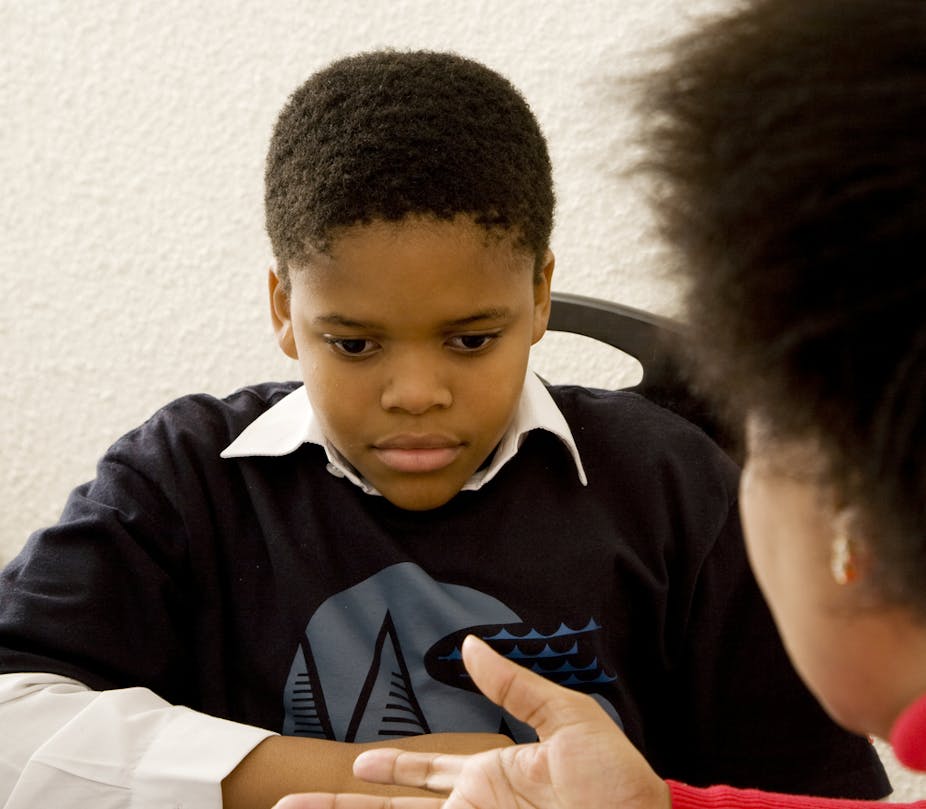One in three people in Britain describe themselves as being very or a little racially prejudiced, according to a recent British Social Attitudes Survey. How are middle-class black families coping with this rise in prejudiced attitudes and preparing their children for a society marred by such discrimination?
We carried out research with professional families of black Caribbean heritage across England and explored how they navigate their children successfully through school.
Our findings, based on 77 interviews, reveal that parents are engaged, involved and concerned about their children’s education success. But they often have to manage the lower expectations of success held by the school and work out how best to prepare their child for a society marked by racism. Parents were particularly concerned about how to ready and protect their children from racist stereotyping – and how and when to talk to them about the dangers of racism.
The apparent threat of black boys
While there are areas of overlap, different stereotypes are seen to exist for boys and girls. The parents we interviewed remained alert to societal stereotypes that seek to position black boys as troublesome, a danger or less smart. Richard, a director within the voluntary sector and the father of two primary school aged boys, worried about how to both prepare and protect his sons from racist encounters. Laughing sadly at the absurdity of the situation, he commented: “You can’t go around everywhere they go, when they go for a job interview, you can’t go ‘My son’s coming in, please don’t stereotype him.’”
Racism and racist stereotyping is understood by these parents to be a natural, inevitable part of everyday life – something that has to understood and survived. Even dress and appearance become a source of potential danger for their children. Simone, a senior policy adviser, describes trying to advise her son not to walk around with his hood up because while he sees nothing wrong with it, the “perception of hoodies in the press” is that “people find it intimidating”.
Sterotypes of black women
Parents with daughters tended to express concern about stereotypical portrayals of black girls and women in popular culture, where notions of beauty are often based on white female norms. Images of hypersexualised black women, black women with weave and lighter skin are seen to dominate music videos, television programmes and wider media to the detriment of a positive, healthy, black female identity.
Sandrine, a senior local government official with a 13-year-old daughter, argued that “sexiness” as marketised by Beyoncé and Rhianna has become synonymous with success. So much so that complex identities, where black women are educated and ambitious, are downplayed and regarded as less desirable, she argued, even by black girls themselves.
Banning MTV
Parents also express concerns about protecting their daughters from versions of beauty that indicate being of mixed heritage or lighter skinned is more desirable. Malorie, an education manager and mother of a 17-year-old daughter, argued: “If you are mixed race in some way you are [seen as] far more attractive than what I call a classic black woman.”
In attempting to police the boundaries of these negative black female stereotypes, Sandrine explained that her sister has responded with her own children by banning MTV – viewed as a major source of such imagery – in her house. Instead, Sandrine attempts to use television as a tool to facilitate debate (although not always welcomed) with her own daughter about individuality, “appropriate” forms of fashion and femininity.
Battle against subtle racism
In seeking to raise a black middle-class child who is confident and successful, parents focus not just on navigating the formal education system but also on how to manage and protect their children from racism. This is a precarious issue for parents. There is a tension between not wanting to talk about it – lest it become viewed as an excuse to give up – alongside an imperative to prepare the child for the reality of racism so that it is not internalised or allowed to affect their confidence.
It is important to note that the racism described by parents in the study is not necessarily the crude overt forms associated with far-right groups, it also refers to subtle, everyday acts evident through racist stereotyping and discriminatory actions.
How and when to talk to children about racism is an ongoing worry for black parents, yet remains a central requirement to preparing their child for wider society. The parents we spoke to were educated, qualified professionals with a range of financial and other resources at their disposal. Nonetheless they still experience racism; being middle class does not protect them nor their children from it.
Such insights not only challenge commonly held views that racism is no longer a key concern in British society but also highlight the range of complex responses and strategies required in order to manage and survive racism.






